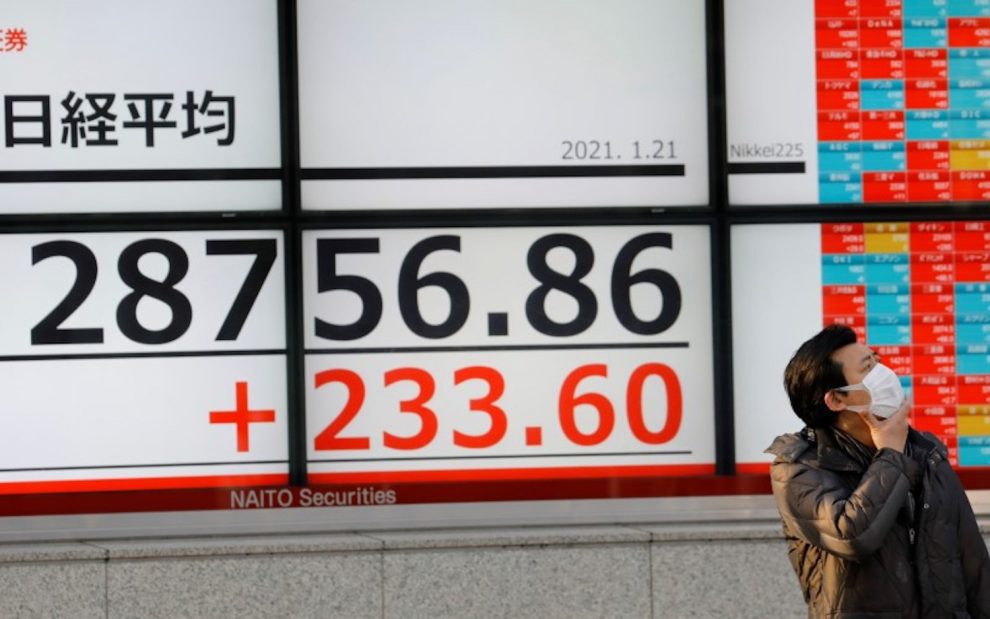Asia’s markets began the week in unspectacular fashion, in sharp contract to last week’s eye-catching rallies, as the ongoing conflict in Ukraine continued to distract investors.
Confidence remains thin because of the crisis in eastern Europe – which threatens to deal a hefty blow to the global economy – as well as central bank monetary tightening measures.
Traders on Monday found it hard to maintain the enthusiasm seen last week that was fuelled by bargain-buying and China’s pledge to support beaten-down markets.
Also on AF: China Tells Microsoft’s Bing to Suspend Auto-Suggest Feature
Hong Kong shares retreated for the second straight day following those massive gains in the middle of last week.
The Hang Seng Index shed 0.89%, or 191.06 points, to 21,221.34. The Shanghai Composite Index edged up 0.08%, or 2.61 points, to 3,253.69, while the Shenzhen Composite Index on China’s second exchange added 0.73%, or 15.64 points, to 2,160.54.
Stock markets elsewhere around the world slipped too as fighting in Ukraine raged on with no sign of a ceasefire even as diplomatic efforts continued, while Brent crude prices climbed above $110 a barrel as supplies remained tight.
Most share markets rallied last week in anticipation of an eventual peace deal on Ukraine, but it could take actual progress to justify further gains.
US President Joe Biden will meet NATO allies on Thursday and visit Poland on Friday.
“The coming days will be a litmus test on whether last week’s risk-on rally was overdone. Hopes related to a peaceful resolution in Ukraine have relied on headlines more than evidence,” ING’s Francesco Pesole and Chris Turner said.
“Should a ceasefire not be agreed in the coming days, markets may struggle to hold on to their sanguine approach to the conflict,” they added.
Investors Wait On Beijing Stimulus
The MSCI world equity index was down 0.05% by 0834 GMT. European shares were choppy with the pan-regional STOXX 600 benchmark last up 0.1%. The S&P 500 and Nasdaq futures were down 0.1% and 0.3% respectively.
In Asia, where Japanese markets were shut for a public holiday, the MSCI’s broadest index of Asia-Pacific shares outside Japan fell 0.7% with investors awaiting further details of possible stimulus from Beijing.
Indian stocks struggled to get going too with Mumbai’s signature Nifty 50 index down 0.98%, or 169.45 points, to close at 17,117.60.
Investors were also waiting to see if Russia would meet more interest repayments this week. It must pay $615 million in coupons this month while on April 4 a $2 billion bond comes due.
Russia will also allow OFZ bond trading on the Moscow Exchange to resume on Monday but equity trading, suspended since Western sanctions threw markets into turmoil late last month, will remain shut.
Bond markets were braced for more hawkish language from the US Federal Reserve with chair Jerome Powell speaking on Monday, and at least half a dozen other members through the week.
Russian Energy Cut-Off Risk
Policymakers have flagged a string of rate rises ahead to take the funds rate to anywhere from 1.75% to 3.0% by the end of the year. The market implies a 50-50 chance of a half point hike in May and an even greater chance by June.
“In balancing the near-term upside risks to inflation with the downside risks to growth, central banks are sending a clear and strong signal that policy is on a path to normalise,” JPMorgan chief economist Bruce Kasman said.
“However, a sustained cut-off of Russian energy supply would push inflation substantially higher, magnifying an already severe squeeze on US consumer purchasing power,” he warned, adding it would likely throw the Euro area into recession.
“Under this scenario, policy normalisation would come to a halt across the world.”
In commodity markets, gold has failed to get much of a lift from safe-haven flows or inflation concerns, losing more than 3% last week. It was last up 0.2% at $1,924 an ounce.
Oil prices also lost ground last week, but were pushing higher on Monday as there was no easy replacement for Russian barrels in a tight market.
Brent rose 4% to $112.20, while US crude rose 4.2% to $109.14 a barrel as European Union countries consider joining the United States in a Russian oil embargo, while a weekend attack on Saudi oil facilities caused jitters.
Key figures around 0820 GMT
Hong Kong – Hang Seng Index > DOWN 0.9% at 21,221.34 (close)
Shanghai – Composite > UP 0.1% at 3,253.69 (close)
Tokyo – Nikkei 225 > Closed for a holiday
London – FTSE 100 > FLAT at 7,404.83
Brent North Sea crude > UP 3.7% at $111.92 per barrel
West Texas Intermediate > UP 4.0% at $108.91 per barrel
New York – DOW > UP 0.8% at 34,754.93 (Friday close)
- Reuters with additional editing by Sean O’Meara























